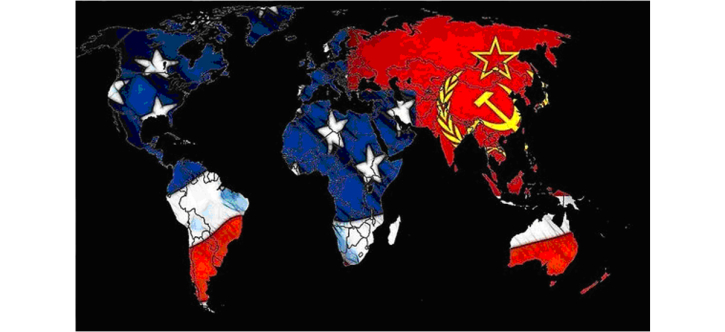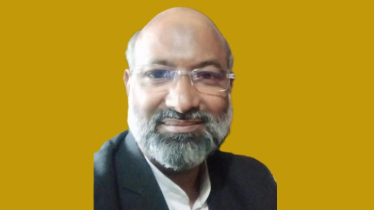
In the ever-evolving landscape of geopolitics, a profound shift is taking place, and it centers on the United States. What is getting increasingly clear from the development of geopolitics is that the USA is slowly but surely losing its ground. The stalemate in the Russia-Ukraine war, the opening of a new front in the Middle East, the waning influence of the USA in critical regions, and above all no gain from the Iraq-Afghanistan war point to a nation gradually losing its global footing.
The anti-war factions from within the USA establishments are raising voices against the Biden administration's fresh proposal of allocating 106 billion dollars as war assistance. But first of all, let’s see what the USA has achieved so far from its latest warfare. Republican presidential candidate Vivek Ramaswami said, after 9 / 11, George Bush and Dick Cheney sent America’s sons and daughters to die in the Middle East and racked up $7 TN in debt for pointless wars that hurt this country. No-win wars that cost trillions, killed millions & made corrupt politicians billionaires. Fast forward 20 years, the Taliban is still in charge in Afghanistan and it's a hostile anti-American regime running Iraq.
Since Joe Biden took office, the United States' war machinery is recalibrating its geopolitical strategies. Notably, Donald Trump stands as the sole U. S. president in recent history who refrained from initiating a new conflict with any nation worldwide. The ongoing initiatives of the U. S. Ambassador to Bangladesh offer a glimpse into how the current Biden administration is redefining its role in the global geopolitical landscape, don’t forget the way it led Ukraine to war against Russia. But long gone are the days of Bangladesh's over-dependence on Western aid, while the shifting center of the global economy towards Asia is increasingly leading towards a multipolar world, where no single power can single-handedly reign supreme. Since the fall of the Soviet Union and the end of the Cold War, world affairs have been disproportionately tilted towards the US-led collective west.
It may not sound like an overstatement now that the days of the West-led globalization are numbered as the global south is not dependent on aid from the north anymore. South-south cooperation is on the rise, while China has appeared as the ready-to-go source of development aid for the poorer countries. More importantly, the Chinese aid is not packaged with any kind of conditionality, as is the case with the World Bank and IMF; much to the relief of the corruption-prone developing countries.
China's recent economic rise has not been accompanied by a corresponding increase in soft power. This is a relatively new phenomenon in international relations, leading to concerns about the potential for conflict between China and other major powers. The Ukraine front is still wide open, and at the same time, the USA is trying its best to prevent the rise of China, both economically and politically. The visit of the US secretary of state to Taiwan is provocation enough. As the USA is not in any way prepared to go to war, they are pursuing a strategy of keeping China on their toes all the time. They are trying their best to prevent China technologically, by banning and limiting the export of chips and semiconductors to Chinese companies by the US companies. Yet China has started making high-quality chips on its own, the Huawei Met 60 smartphone is an indication of what China can do. China is now capable of making high-end products on its own, not entirely dependent on US technology. It irked the US establishment in such a way that the US House of Representatives held a heated discussion on how China could make such a high-end product; they must still be stealing US technology, that’s how they retorted.
Under Xi Jinping, China is now flexing its political muscle; long gone are the days when they were limited to geo-economics only. They are also trying to exert their soft power in different forms, no matter what the consequences are, as the case is evident in Bangladesh.
On the other hand, the Western-led and globalization-based neoliberal system is failing, which in fact, is complex and involves various perspectives.
Firstly, neoliberal policies often prioritize free markets and minimal government intervention leading to economic inequality, as wealth concentrates among a few while leaving many behind. Scholars like Joseph Stiglitz argue that the neoliberal agenda contributes to social discontent by neglecting social welfare.
Secondly, globalization has unevenly benefited nations and populations. The so-called global institutions have devised systems in a way that still reflects the status quo of their founding time-the president of the World Bank is always an American, while the head of the International Monetary Fund (IMF) is always a European. But things are not the same as they were in the immediate aftermath of the Second World War. The global economic system reinforces the dominance of developed nations, leaving others in a perpetual struggle.
Thirdly, neoliberal globalization is criticized for neglecting local cultures and fostering a sense of alienation, contributing to the rise of populist leaders who promise protectionism.
Fourthly, some theorists argue that the neoliberal system may be struggling to adapt to a multipolar world, impacting its effectiveness.
Given the above, a multipolar world, as opposed to a globalized world, can be an effective alternative.
Russian philosopher and political scientist Alexander Dugin is a leading proponent of the concept of multipolarity. He argues that the current unipolar world order, dominated by the United States, is unstable and unjust. He believes that a multipolar world order, in which multiple centers of power coexist and compete with each other, would be more stable and fair.
Dugin's vision of multipolarity is based on the idea that different civilizations have different values and traditions, and that these differences should be respected. He believes that the West has tried to impose its values and traditions on the rest of the world and that this has led to conflict and instability.
Dugin argues that a multipolar world order would allow different civilizations to develop their own unique cultures and economies. He believes that this would lead to a more peaceful and prosperous world.
The unbending attitude of the USA leads to a cementing of the relationship between Russia and China, while the waning influence of the USA in the Middle East is clear enough from different perspectives. The Islamic countries are regrouping in the Middle East, while many of them have undertaken long-due modernization measures. India stands at a crossroads; standing between the global south and and the north. They may play the most vital role in bridging the two regions, so a lot depends on the Indian leadership.
Again Kissinger
Former advisor to the US president Henry Kissinger recently visited China and expressed his view that the relationship between the two countries is crucial for the peace and prosperity of both countries and for the world. Kissinger’s visit to China at the age of 100 is an interesting one, given the deteriorating relationship between the countries.
Kissinger's visit is widely seen as an attempt to improve relations between the United States and China, which have been strained in recent years. Kissinger has a long history of engagement with China, and he is widely respected by Chinese leaders.
It is unclear what specific topics Kissinger discussed with Xi Jinping during their meeting. However, some experts believe that Kissinger may have urged Xi to take a more cooperative approach on issues such as trade, climate change, and the Taiwan Strait.
Kissinger's visit comes at a time when the United States and China are engaged in several high-level talks aimed at improving relations. US Secretary of State Antony Blinken visited China in March 2023, and US Climate Envoy John Kerry visited China in May 2023.
When presenting these alternatives, it's essential to highlight that there is no one-size-fits-all solution, and each approach comes with its own set of challenges and trade-offs. Evaluating the effectiveness of these alternatives requires a nuanced understanding of local contexts, cultural nuances, and the evolving global landscape. The bottom line is that the present world order needs to be changed to accommodate the current reality.
The writer is Senior Journalist.

.png)







